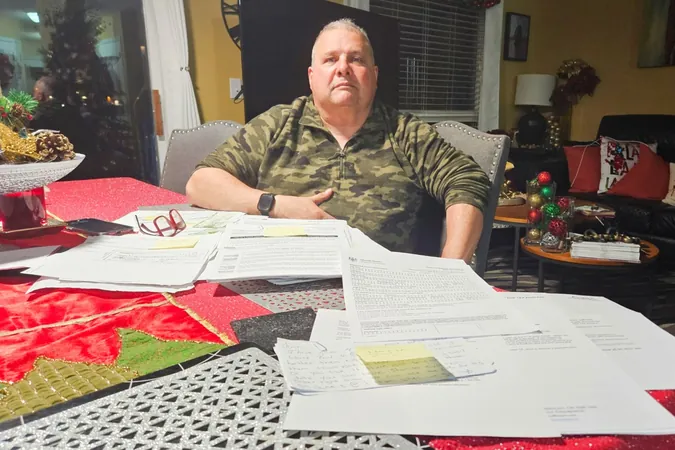
Is Quebec On the Brink of an Independence Referendum Again?
2025-01-04
Author: Emma
The Resurgence of the Sovereignty Movement
As the 30th anniversary of Quebec's second independence referendum approaches, whispers of a resurgence in the sovereignty movement are growing. A decade ago, Jean-François Lisée, then leader of the Parti Québécois (PQ), suggested that under the right circumstances, Quebec's independence aspirations could be reignited. Fast forward to today, and after years of political dominance by Francois Legault and his Coalition Avenir Québec (CAQ), the landscape appears to be shifting once more.
Political Landscape Shifts
The 2018 election marked a pivotal turn for Quebec politics; Lisée's PQ was reduced to just 10 seats as Legault's moderate nationalist CAQ promised stability and unity, focusing on provincial issues without the divisive question of a referendum. Legault’s victory suggested that many wished to move past the separation debate that had long characterized Quebec's political identity.
The Rise of Paul St-Pierre Plamondon
However, current events suggest that Legault's popularity has waned after six years in power, while the PQ, now led by the dynamic Paul St-Pierre Plamondon, has surged in poll numbers. This shift signals a potential revival of interest in Quebec sovereignty. St-Pierre Plamondon, a charismatic and educated leader, has been able to resonate with younger voters, who previously felt disconnected from the independence dialogue. His leadership has re-inspired the party, and if elections were to be held today, polls indicate that the PQ could secure a majority.
Youth Engagement and Independence
One key voice in this movement is Émile Simard, head of the PQ’s youth wing. Growing up in a pro-sovereignty family, Simard has directly experienced a shift in the conversation surrounding independence. He points to critical contemporary issues, such as climate change, arguing that it feels counterintuitive for Quebecers to invest in Alberta's fossil fuel industry despite their generous tax contributions.
Generational Disconnect
Yet, while the PQ gains traction, the overarching support for independence remains stagnant at about 35%, highlighting a generational disconnect with the independence narrative. David Heurtel, a political analyst, emphasizes that today's youth are less inclined towards strong nationalism. Many young Quebecers, like Simard himself, have never participated in a referendum, making the question of independence largely hypothetical for them. In their first encounter with a campaign, they might begin to explore the potential realities of independence. Simard believes that an upcoming referendum could stimulate these discussions, pushing younger citizens to actively engage in the sovereignty debate.
The Open Mind of a New Generation
Interestingly, polls show that young Quebecers do not strongly identify with either sovereignty or federalism, largely due to a lack of dialogue on the subject. This could mean that the new generation is open to exploring independence, especially if they perceive opportunities for positive outcomes distinct from a united Canada.
Impact of Federal Politics
However, the political environment in Canada could significantly impact the independence conversation. The possibility of a federal Conservative government under Pierre Poilievre could reshape the dynamics of the separatist argument, as his leadership style contrasts with that of Prime Minister Justin Trudeau, who has often been viewed as a target for nationalist sentiments.
Future of Quebec's Independence
Indeed, as calls grow for Trudeau to take a more direct role in advocating for national unity, many see him as a more formidable opponent against rising sovereignty sentiments, particularly if the PQ makes significant gains on provincial levels. With both federal and provincial elections on the horizon, the potential for a confluence of events could give fresh life to Quebec’s independence aspirations. If the PQ can successfully rekindle the Quebec independence discourse and engage the youth in meaningful conversations, the next electoral cycle may very well revolve around a question that many thought was laid to rest.
Optimism for the Future
As the political tide begins to shift, voices like Simard’s express optimism for the future, stating, "I’m confident that a referendum is coming and that the population is ready. I think it’s time to write the end of this chapter in Quebec.” The evolution of this narrative remains to be seen, but one thing is clear: the discussion on Quebec’s sovereignty is far from over.









 Brasil (PT)
Brasil (PT)
 Canada (EN)
Canada (EN)
 Chile (ES)
Chile (ES)
 Česko (CS)
Česko (CS)
 대한민국 (KO)
대한민국 (KO)
 España (ES)
España (ES)
 France (FR)
France (FR)
 Hong Kong (EN)
Hong Kong (EN)
 Italia (IT)
Italia (IT)
 日本 (JA)
日本 (JA)
 Magyarország (HU)
Magyarország (HU)
 Norge (NO)
Norge (NO)
 Polska (PL)
Polska (PL)
 Schweiz (DE)
Schweiz (DE)
 Singapore (EN)
Singapore (EN)
 Sverige (SV)
Sverige (SV)
 Suomi (FI)
Suomi (FI)
 Türkiye (TR)
Türkiye (TR)
 الإمارات العربية المتحدة (AR)
الإمارات العربية المتحدة (AR)